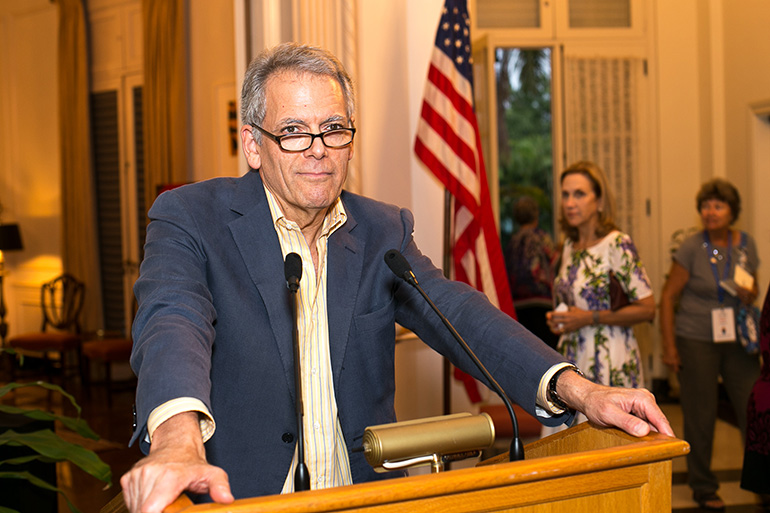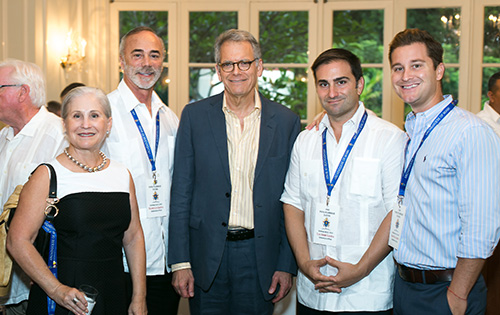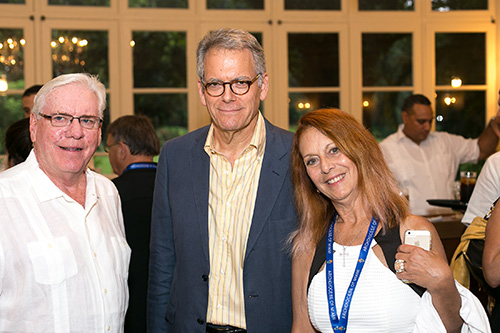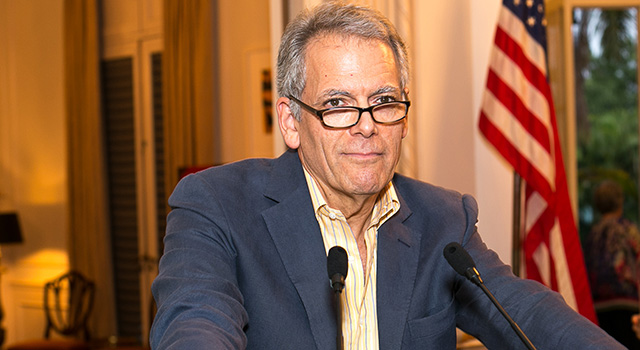By Tom Tracy - Florida Catholic

Photographer: TOM TRACY | FC
Ambassador Jeffrey DeLaurentis, chief of mission at the U.S. embassy in Havana, speaks to pilgrims from Miami and Boston during a reception at his residence in Havana.
HAVANA | The top U.S. diplomat to Cuba told a group of American Catholics from the Miami Archdiocese and elsewhere that they play a role in their country's normalization of relations with Cuba.
"As we all know this visit from Pope Francis comes in the context of his role in the U.S.-Cuba rapprochement process, and obviously to reach normalization relations with Cuba it will be a long and complex role," said Ambassador Jeffrey DeLaurentis, a career member of the Senior Foreign Service and Chargé d'Affaires at the U.S. Embassy.
He spoke to the U.S. pilgrims during an evening reception at the embassy residence in Havana following the papal Mass Sept. 20. The U.S. Catholics on hand for the private reception included a group of lay people from the Boston Archdiocese.
Both Miami Archbishop Thomas Wenski and Boston's Cardinal Sean O'Malley were in Cuba for the papal visit although neither was at the reception, as they were taking part in a meeting with the pope in Havana’s cathedral.

Photographer: TOM TRACY | FC
Ambassador Jeffrey DeLaurentis, center, chief of mission at the U.S. embassy in Havana, poses with Miami Deacon Ralph Gazitua, second from left, his wife María Elena (Cookie) and their two sons, Andy and Sean, all of whom were part of the archdiocesan pilgrim group to Cuba for Pope Francis' visit.
"The pope called it a process, and we are making progress every day. It is a process that extends far beyond the pope as an individual or even the leader of the Catholic Church; it involves a lot of you, and this is why your presence here in Cuba today is very important," said DeLaurentis, a graduate of the Georgetown School of Foreign Service who said he was on hand for the papal Mass. He helped lead the recent U.S. flag-raising ceremony at the re-established U.S. Embassy in Cuba.
"Some of you were able to visit Cuba on the historic visit of Pope Benedict XVI in 2012 but under very different diplomatic circumstances, so a lot can happen in a few years, DeLaurentis said. "Without stating the obvious, a papal visit is of great significance to the Cuban people. There have been three in the last 17 years which seems to me are indications of Cuba's evolving relationship with the world, with the Roman Catholic Church and now with the people of the United States."
Prior to taking up this position in August 2014, Ambassador DeLaurentis served for three years as the Alternate Representative for Special Political Affairs at the U.S. Mission to the United Nations. He has served twice before in Havana, first as consular officer from 1991 to 1993, then as Political-Economic Section Chief from 1999 to 2002.
DeLaurentis said he thought the papal visit to Havana and the Mass at Revolution Plaza had been "spectacular" and that the messages were clear.
He noted what U.S. Secretary of State John Kerry said at the flag raising ceremony on Aug. 14, that it is for the people of Cuba to decide the future of their country, “but we believe that it is people of good faith, good will coming together in the spirit of friendship, cooperation and transparency that will ultimately help the people of Cuba make the decisions and have the space to make the decisions about their future. The Catholic Church here has had a very important if not critical role for decades."

Photographer: TOM TRACY | FC
Ambassador Jeffrey DeLaurentis, center, chief of mission at the U.S. embassy in Havana, poses for a photo with Coral Springs Mayor Skip Campbell, one of the Miami pilgrims, left, and Vivian Mannerud, owner of Airline Brokers, which handled the logistics of the pilgrimage.
DeLaurentis said he recalled meeting with some 40 seminarians in Havana in 1991 and that as the first U.S. diplomat to visit the seminary he was inspired to see the Church working in communities here. He noted that Church traditions were not completely lost in Cuba and that Cuba was beginning to acknowledge the role of religion in Cuban society.
Pope Francis, he said, has talked about building bridges and reconciliation with Cuba. "Cardinal Ortega mentioned that today during the Mass — that is what he was trying to get at when he made the specific request that Cubans on the island and Cubans all over the world do their best to make a special effort to move forward to reconciliation and the future."
The sign of peace during the papal Mass in Havana was full of symbolism, DeLaurentis added.
"Today under the gaze of Pope Francis that moment to me had some resonance and I think it is very important — the Catholic Church is very experienced in the way of diplomacy and has 2,000 years of practice. It survived and flourished in exceptionally difficult circumstances across time and cultures precisely because it operates with skillful diplomats here.
"The two principal diplomats that the Holy See has here in Cuba are excellent, one is from Italy and the other from Croatia,” he told the Americans.
"Peace or maybe the absence of conflict is a critical condition in which diplomacy can help to create a more constructive world and it is in that spirit that we are thankful for Pope Francis' role in the effort to address the U.S.-Cuban relationship and in which we welcome continued Church engagement. As you know, he added Cuba to an original visit to the United States for obvious reasons and I think we will continue to benefit from his guidance.
"As we plow ahead to build a more constructive relationship keep us in your prayers as we move forward. The Church here will continue to have a very important role,” Ambassador DeLaurentis concluded.


Comments from readers